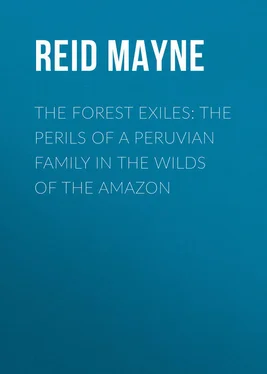Mayne Reid - The Forest Exiles - The Perils of a Peruvian Family in the Wilds of the Amazon
Здесь есть возможность читать онлайн «Mayne Reid - The Forest Exiles - The Perils of a Peruvian Family in the Wilds of the Amazon» — ознакомительный отрывок электронной книги совершенно бесплатно, а после прочтения отрывка купить полную версию. В некоторых случаях можно слушать аудио, скачать через торрент в формате fb2 и присутствует краткое содержание. Жанр: literature_19, foreign_antique, foreign_prose, на английском языке. Описание произведения, (предисловие) а так же отзывы посетителей доступны на портале библиотеки ЛибКат.
- Название:The Forest Exiles: The Perils of a Peruvian Family in the Wilds of the Amazon
- Автор:
- Жанр:
- Год:неизвестен
- ISBN:нет данных
- Рейтинг книги:4 / 5. Голосов: 1
-
Избранное:Добавить в избранное
- Отзывы:
-
Ваша оценка:
- 80
- 1
- 2
- 3
- 4
- 5
The Forest Exiles: The Perils of a Peruvian Family in the Wilds of the Amazon: краткое содержание, описание и аннотация
Предлагаем к чтению аннотацию, описание, краткое содержание или предисловие (зависит от того, что написал сам автор книги «The Forest Exiles: The Perils of a Peruvian Family in the Wilds of the Amazon»). Если вы не нашли необходимую информацию о книге — напишите в комментариях, мы постараемся отыскать её.
The Forest Exiles: The Perils of a Peruvian Family in the Wilds of the Amazon — читать онлайн ознакомительный отрывок
Ниже представлен текст книги, разбитый по страницам. Система сохранения места последней прочитанной страницы, позволяет с удобством читать онлайн бесплатно книгу «The Forest Exiles: The Perils of a Peruvian Family in the Wilds of the Amazon», без необходимости каждый раз заново искать на чём Вы остановились. Поставьте закладку, и сможете в любой момент перейти на страницу, на которой закончили чтение.
Интервал:
Закладка:
Guapo’s features were thin, sharp, and intelligent. His eye was keen and piercing; and the gait of the old man, as he strode along the rocky path, told that it would be many years before he would show any signs of feebleness or tottering.
There were four animals that carried our travellers and their effects. One was a horse ridden by the boy Leon. The second was a saddle mule, on which rode Doña Isidora and Leona. The other two animals were not mounted. They were beasts of burden, with “yerguas,” or pack-saddles, upon which were carried the few articles that belonged to the travellers. They, were the camels of Peru – the far-famed llamas. Don Pablo, with his faithful retainer, travelled afoot.
You will wonder that one apparently so rich, and on so distant a journey, was not provided with animals enough to carry his whole party. Another horse at least, or a mule, might have been expected in the cavalcade. It would not have been strange had Guapo only walked – as he was the arriero, or driver, of the llamas – but to see Don Pablo afoot and evidently tired, with neither horse nor mule to ride upon, was something that required explanation. There was another fact that required explanation. The countenance of Don Pablo wore an anxious expression, as if some danger impended; so did that of the lady, and the children were silent, with their little hearts full of fear. They knew not what danger, but they knew that their father and mother were in trouble. The Indian, too, had a serious look; and at each angle of the mountain road he and Don Pablo would turn around, and with anxious eyes gaze back in the direction that led towards Cuzco. As yet they could distinguish the spires of the distant city, and the Catholic crosses, as they glistened under the evening sunbeam. Why did they look back with fear and distrust? Why? Because Don Pablo was in flight, and feared pursuers ! What? Had he committed some great crime? No. On the contrary, he was the victim of a noble virtue – the virtue of patriotism! For that had he been condemned, and was now in flight – flying to save not only his liberty but his life! yes, his life ; for had the sentinels on those distant towers but recognised him, he would soon have been followed and dragged back to an ignominious death.
Young reader, I am writing of things that occurred near the beginning of the present century, and before the Spanish-American colonies became free from the rule of Old Spain. You will remember that these countries were then governed by viceroys, who represented the King of Spain, but who in reality were quite as absolute as that monarch himself. The great viceroys of Mexico and Peru held court in grand state, and lived in the midst of barbaric pomp and luxury. The power of life and death was in their hands, and in many instances they used it in the most unjust and arbitrary manner. They were themselves, of course, natives of Old Spain – often the pampered favourites of that corrupt court. All the officials by which they were surrounded and served were, like themselves, natives of Spain, or “Gachupinos,” (as the Creoles used to call them,) while the Creoles – no matter how rich, or learned, or accomplished in any way – were excluded from every office of honour and profit. They were treated by the Gachupinos with contempt and insult. Hence for long long years before the great revolutions of Spanish America, a strong feeling of dislike existed between Creole Spaniards and Spaniards of Old Spain; and this feeling was quite independent of that which either had towards the Indians – the aborigines of America. This feeling brought about the revolution, which broke out in all the countries of Spanish America (including Mexico) about the year 1810, and which, after fifteen years of cruel and sanguinary fighting, led to the independence of these countries.
Some people will tell you that they gained nothing by this independence, as since that time so much war and anarchy have marked their history. There is scarcely any subject upon which mankind thinks more superficially, and judges more wrongly, than upon this very one. It is a mistake to suppose that a people enjoys either peace or prosperity, simply because it is quiet. There is quiet in Russia, but to its millions of serfs war continuous and eternal; and the same may be said of many other countries as well as Russia. To the poor slave, or even to the over-taxed subject, peace is no peace, but a constant and systematised struggle, often more pernicious in its effects than even the anarchy of open war. A war of this kind numbers its slain by millions, for the victims of famine are victims of political crime on the part of a nation’s rulers. I have no time now to talk of these things. Perhaps, boy reader, you and I may meet on this ground again, and at no very distant period.
Well, it was not in the general rising of 1810 that Don Pablo had been compromised, but previous to that. The influence of the European Revolution of 1798 was felt even in distant Spanish America, and several ebullitions occurred in different parts of that country at the same time. They were premature; they were crushed. Those who had taken part in them were hunted to the death. Death! death! was the war-cry of the Spanish hirelings, and bitterly did they execute their vengeance on all who were compromised. Don Pablo would have been a victim among others, had he not had timely warning and escaped; but as it was, all his property was taken by confiscation, and became the plunder of the rapacious tyrant.
We are introduced to him just at the period of his escape. By the aid of the faithful Guapo he had hastily collected a few things, and with his wife and family fled in the night. Hence the incompleteness of his travelling equipage. He had taken one of the most unfrequented paths – a mere bridle-road – that led from Cuzco eastward over the Cordillera. His intent was to gain the eastern slope of the Andes mountains, where he might conceal himself for a time in the uninhabited woods of the Great Montaña , and towards this point was he journeying. By a ruse he had succeeded in putting the soldiers of the despot on a false track; but it was not certain that they might not yet fall into the true one. No wonder then, when he gazed back towards Cuzco, that his look was one of apprehension and anxiety.
Chapter Three.
The Poison-Trees
Following the rugged and winding path, the travellers had climbed to a height of many thousand feet above the ocean level. There was very little vegetation around them. Nothing that deserved the name of tree, if we except a few stunted specimens of quenoa trees ( Polylepis racemosa ), and here and there patches of the Ratanhia shrub ( Krameria ), which covered the hill-sides. Both these are used by the mountain Indians as fuel, but the Ratanhia is also a favourite remedy against dysentery and blood-spitting. Its extract is even exported to European countries, and is to be found in the shop of the apothecary.
Now and then a beautiful species of locust was seen with its bright red flowers. It was the “Sangre de Christo” of the Peruvian flora .
Don Pablo Romero was a naturalist, and I may here tell you a pleasant and interesting fact – which is, that many of the earliest patriots and revolutionists of Spanish America were men who had distinguished themselves in natural science – in fact, were the “savans” of these countries. I call this a pleasant fact, and you may deem it a curious one too, because men of science are usually lovers of peace, and not accustomed to meddle either in war or politics. But the truth of the matter is this, – under the government of the viceroys all books, except those of a monkish religion, were jealously excluded from these countries. No political work whatever was permitted to be introduced; and the people were kept in the grossest ignorance of their natural rights. It was only into learned institutions that a glimmering of the light of freedom found its way, and it was amongst the professors of these institutions that the “rights of men” first began to be discussed. Many of these noble patriots were the first victims offered up on the altar of Spanish-American independence.
Читать дальшеИнтервал:
Закладка:
Похожие книги на «The Forest Exiles: The Perils of a Peruvian Family in the Wilds of the Amazon»
Представляем Вашему вниманию похожие книги на «The Forest Exiles: The Perils of a Peruvian Family in the Wilds of the Amazon» списком для выбора. Мы отобрали схожую по названию и смыслу литературу в надежде предоставить читателям больше вариантов отыскать новые, интересные, ещё непрочитанные произведения.
Обсуждение, отзывы о книге «The Forest Exiles: The Perils of a Peruvian Family in the Wilds of the Amazon» и просто собственные мнения читателей. Оставьте ваши комментарии, напишите, что Вы думаете о произведении, его смысле или главных героях. Укажите что конкретно понравилось, а что нет, и почему Вы так считаете.












